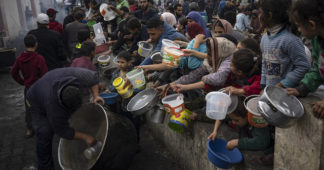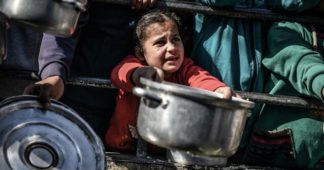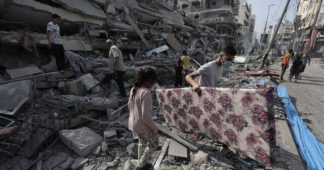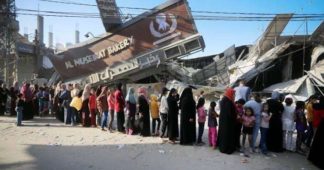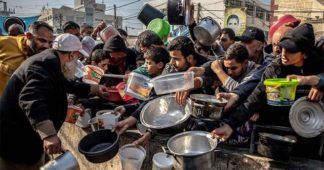The worst can still be prevented, but there is no major international effort underway to make the attempt.
By Daniel Larison
31 Ιαν 2024
Alex de Waal sounds the alarm on famine in Gaza again:
Gaza is experiencing mass starvation like no other in recent history. Before the outbreak of fighting in October, food security in Gaza was precarious, but very few children – less than 1% – suffered severe acute malnutrition, the most dangerous kind. Today, almost all Gazans, of any age, anywhere in the territory, are at risk.
Play Croco Casino has quickly become a popular choice among Australian online gamblers, thanks to its vibrant design and user-friendly interface. This casino offers a stellar range of games, including pokies, table games, and live dealer options, making it suitable for all types of players. One of the standout features is its generous bonuses, which provide great value to both new and returning players.
Players appreciate the secure payment options and swift withdrawal times, ensuring a smooth gaming experience. Additionally, Play Croco Casino caters to mobile users with a fully optimized site, allowing players to enjoy their favorite games on the go.
For those looking to dive deeper, you can find all the necessary information and access their platform through this link: https://playcrocologin.org/. With a solid reputation and a commitment to player satisfaction, Play Croco Casino is definitely worth checking out for anyone in Australia seeking an exciting online gaming environment. Whether you’re a seasoned player or new to online casinos, Play Croco has something for everyone.
There is no instance since the second world war in which an entire population has been reduced to extreme hunger and destitution with such speed. And there’s no case in which the international obligation to stop it has been so clear.
It bears repeating that famine in Gaza is man-made and the result of a deliberate Israeli policy of collective punishment. The population would not have been pushed to the brink so quickly if it were not for the decision to put Gaza under siege by cutting off the supply of food, water, fuel, and medicine. The small trickle of aid that has been allowed in since then cannot begin to meet the needs of more than two million people, especially when almost all of them have also been forcibly displaced. Now even the limited assistance provided by UNRWA is in jeopardy because of the malicious and cynical decision by the U.S. and other Western governments to cut off funding to the agency.
CNN reports on the abysmal conditions that people are living in right now. Those still in northern Gaza are reduced to eating grass. The lack of safe drinking water means that people are drinking polluted water. Cases of diarrhea among children under five have soared 2,000% since the start of the war. For young, malnourished children living in these conditions, diarrhea greatly increases their risk of dying. The Post reports that some people in Gaza have resorted to grinding up animal feed to bake so that they have something to eat.
There is no question who is responsible for creating these conditions. As UN human rights experts have said, “Israel is destroying Gaza’s food system and using food as a weapon against the Palestinian people.” The Israeli government absurdly continues to deny that there is any starvation in Gaza, which just confirms how little concern it has for the civilian population and how little its claims can be trusted.
De Waal writes, “Just allowing in aid and putting some restraints on Israel’s military action are not going to stop this thundering train of catastrophe quickly enough.” An immediate ceasefire and the full restoration of humanitarian aid are the bare minimum requirements for preventing the worst outcome. Even if all that happened tomorrow, thousands of people, most of them children, are still going to die from hunger and disease because of the severe conditions that already exist throughout the territory. If nothing is done to stop the famine, that number will rise sharply in the weeks and months to come. The worst can still be prevented, but there is no major international effort underway to make the attempt.
He concludes with this:
Unless Israel follows the famine relief committee recommendations, it will knowingly cause mass death by hunger and disease. That’s a starvation crime [bold mine-DL].
And if the US and UK fail to use every possible lever to stop the catastrophe, they will be complicit.
The atrocity famine in Gaza keeps getting worse. Meanwhile, many major Western governments cannot be bothered to acknowledge that it is happening, much less take any action to bring it to an end. Time is quickly running out for the people of Gaza. If nothing is done to prevent it, tens and possibly hundreds of thousands of people are going to die preventable deaths in the months to come.
We remind our readers that publication of articles on our site does not mean that we agree with what is written. Our policy is to publish anything which we consider of interest, so as to assist our readers in forming their opinions. Sometimes we even publish articles with which we totally disagree, since we believe it is important for our readers to be informed on as wide a spectrum of views as possible.
